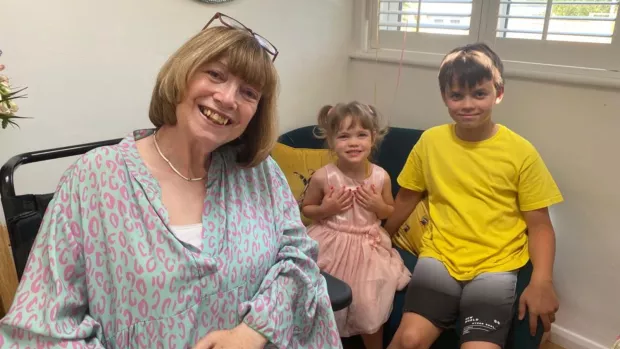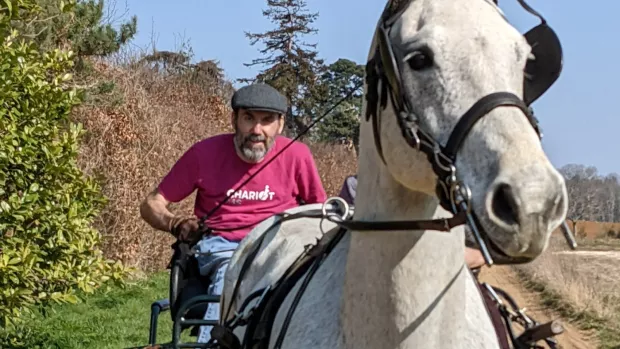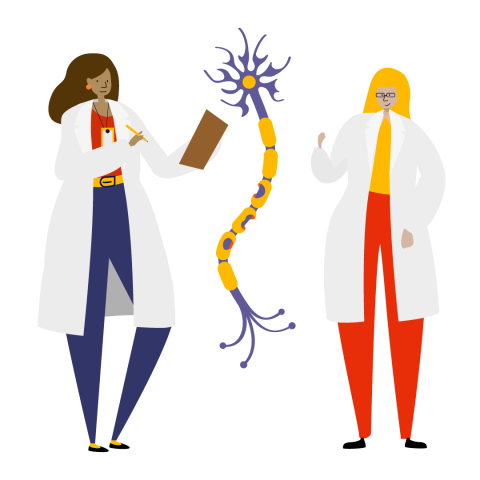
Meet the researcher fighting for treatment at every stage of MS
Professor Klaus Schmierer leads research into treatments during the diagnostic phase all the way through to advanced MS. We spoke to Klaus to find out why it’s important for people with MS to be given the choice of disease modifying therapy at every stage of their journey.
I started my career as a paramedic in Munich, Germany, before moving to Berlin to read medicine. After completing my training, I relocated to London. My initial plan to train as an A and E doctor had been taken over by a fascination for neurology.
Neurology had long been a speciality where you walked away once a diagnosis was made, leaving management of the condition to others. However, MS is a key example where that’s changed, and we’ve come really far over the past 25-30 years! It’s now a condition where treatment, including disease moderating therapy (DMT), are constantly improving.
Time matters
Evidence suggests starting highly-effective DMT early provides the best chances long-term. Possibly meaning you could lead your life as before your MS started. The sooner we start treatment, the more lesions and disability we may be able to prevent.
But how early is early? This is the question a new trial called AttackMS is going to address.
Treating MS more like we treat stroke
The goal of AttackMS is to treat MS with a similar urgency as cancer or stroke.
We’ll compare:
- starting a highly effective DMT within 14 days of someone coming to A and E who looks like they have MS
- starting treatment from 12 weeks onwards, which is a standard time to see a neurologist in the NHS
We’re using natalizumab (Tysabri®), which is currently licensed for people with rapidly evolving severe MS. All participants will have the option to continue on natalizumab on the NHS after the study.
Our hypothesis is that effectively blocking MS inflammation in such a short timeframe (14 days) will help with the brain’s own natural myelin repair. And ultimately reduce the risk of longer-term disability build-up.
Who can take part?
The big change here is that in AttackMS, we’ll treat people not only if they have a confirmed diagnosis of MS, but also people who have at least 80% chance of having MS. This includes those with clinically isolated syndrome.
Some people might be wondering how we could treat people with such a powerful DMT before the diagnosis of MS is secured. Diagnosing MS is not always easy. And while many clinicians understandably want to be 100% sure before starting treatment, it could mean precious time is lost.
That’s why in AttackMS we decided that, based on symptoms and MRI scans, a four in five chance is sufficient to start treatment and confirm the diagnosis of MS in due course.
AttackMS is open for recruitment at three sites in London but people can be referred from anywhere in the UK.
To find out more, email us at [email protected].
Watch a video about AttackMS at the Video Journal of Neurology
#ThinkHand
In AttackMS, we’re testing the hypothesis that DMT is effective at the very beginning of MS. Along side this, we’re also researching the use of DMT throughout the journey of MS, including the progressive and advanced stage.
Together with colleagues at Queen Mary University London, and people with MS, we developed the #ThinkHand campaign. This campaign raises awareness of the importance of upper limb function in MS.
For people with MS who use a wheelchair, their arms and hands become particularly important, taking over much of their leg function. It’s their mobility, their independence, their freedom. Yet in the UK, you lose access to DMT once you become a regular wheelchair user.
We call this group, people with “advanced MS”. They represent a large subgroup: about 35%, of people with MS. The large majority of those with advanced MS have had progressive MS for some time.
Looking beyond leg function
Recent studies have looked at the brains of people with advanced MS after they pass away. These brains show ongoing inflammation in most people with MS, even at this advanced stage. And early evidence shows that in people with advanced MS, arm and hand function responds better to DMT than leg function.
So we think stopping inflammation might slow down the progression of problems with arms and hands in advanced MS.
ChariotMS was a natural continuation of our #ThinkHand campaign. The trial primarily tests whether an existing DMT, cladribine tablets, can help people with advanced MS to keep the use of their arms and hands.
ChariotMS is the worldwide first DMT trial to solely focus on this group. It’s also the first DMT trial with no upper age limit, and there’s also no restriction based on how long you’ve had MS. So ChariotMS is a very inclusive study for people who may have never had a chance to take part in a DMT trial before.
The trial is now open for recruitment at 20 sites across the UK.
Find out more about taking part in ChariotMS
My hopes for the future of MS research
As long as we can't prevent MS altogether, we need to effectively manage it. The evidence keeps getting stronger that effective DMT is a key element of MS care at any stage of the condition. I hope ChariotMS, AttackMS, and other trials, will lead to ever more effective DMT throughout the course of MS, to maintain and improve quality of life for all.


